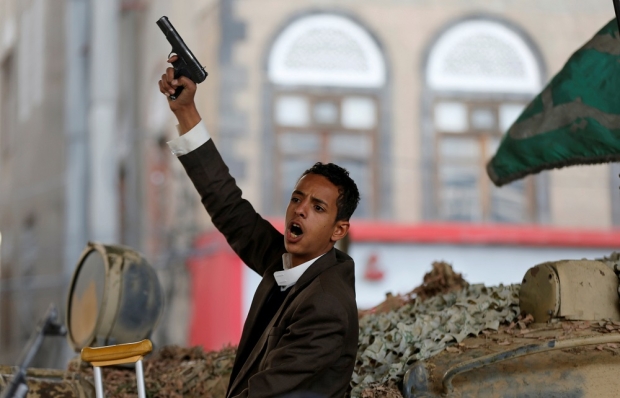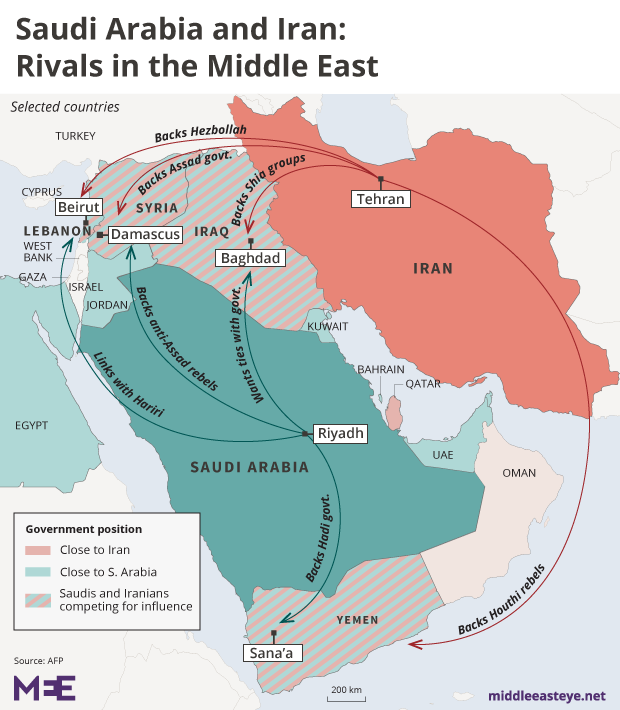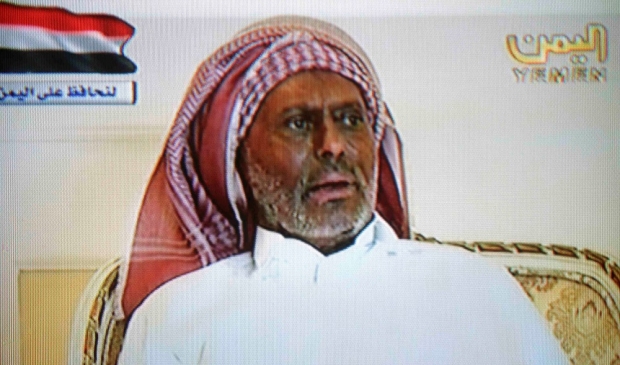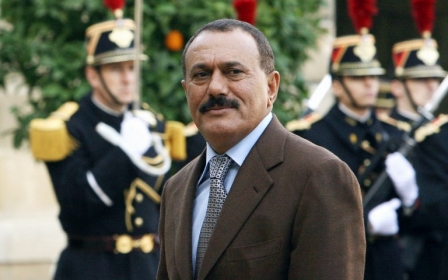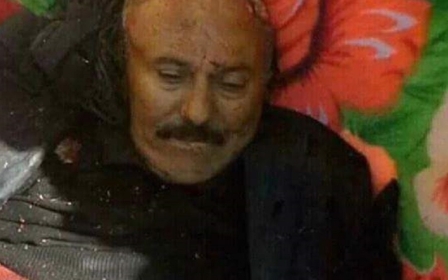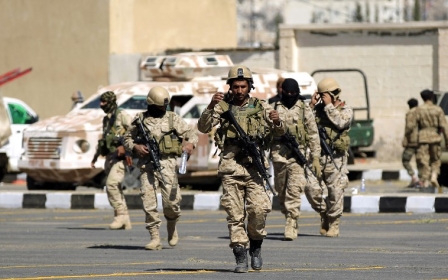ANALYSIS: Yemen's king of snakes is dead, but more will rise in his place
On the outskirts of Sanaa, Yemen’s former president Ali Abdullah Saleh was stopped at a checkpoint by his recently renounced Houthi allies, who reportedly dragged the 75-year-old Saleh from his car and shot him in the back of the head.
Less than a week before, the two parties were in a strategic alliance against the Saudi-led coalition, which backs the so-called legitimate government of Abd Rabbuh Hadi, Saleh’s former vice president. Now he is dead.
Saleh has now been transformed into a martyr by many Yemenis
- Waleed Mahdi, Yemen researcher
The last week has witnessed monumental, yet not entirely unpredictable, shifts in Yemen alliances. Analysts and Yemenis inside both the Houthis and Saleh's party, the GPC, say the death will shake the foundations of an already collapsing country, embolden the Houthis against their enemies and bring more misery on the people of Yemen.
A former member of the Houthi movement, who requested anonymity, told Middle East Eye he felt sure the elimination of an immensely powerful rival, so quickly, puts the Houthis in a position of great strength.
They have, however, further alienated many Yemenis who, regardless of their feelings towards former president Saleh, do not approve of the timing or manner of his death.
"Saleh has now been transformed into a martyr by many Yemenis," said Waleed Mahdi, a Yemen researcher and assistant professor at the Department of International and Area Studies at the University of Oklahoma.
"Not because they necessarily liked him, but because his death signifies the end of one era and the beginning of a much worse one - one that is marked by economic strife, a dysfunctional government, and widespread corruption.”
Given the rate at which power balances are shifting, it is difficult to say what is in store for Yemen’s conflict in the coming months.
Will Picard, the founder and executive director of the Yemen Peace Project, said there were a few general trends we may see.
"First, the coalition is likely to intensify its air campaign now, and will likely treat Sanaa as a free-fire zone, as it does Saada. We'll probably see far more civilian casualties from air strikes in the coming days.
"Second, if the Houthis can hold onto their territory, they will probably launch reprisals against anyone in Sanaa and the surrounding governorates that they see as a GPC sympathiser. This will mean attacks on tribal leaders as well as political figures, and the alignment of tribal armed forces could change as a result.
"Third, it is possible that Iran will escalate its involvement in the war. If it views this as a life-or-death moment for the Houthis, and its last chance to gain some advantage in Yemen, Iran could commit more resources to the fight.”
International power game
Although the Houthis are frequently described as an Iranian proxy, the amount of material support provided to them by the Islamic Republic is debatable. This, however, could change as the conflict continues to escalate.
Saudi and Emirati forces are likely dismayed by the death of Saleh, who was apparently willing to strike a deal with them to undermine the Houthis and help the coalition win the war in exchange for a power-sharing deal involving him or his son, Ahmed.
Now the same efforts to undermine the Houthis would have to come from influential GPC supporters still in Sanaa, or from those who are disillusioned by the killing of Saleh and are increasingly resentful of the Houthis' inability to govern.
The anonymous former Houthi said: "An incident such as this - the killing of a man who ruled for almost 40 years - would make any sensible person reluctant to predict the coming scenarios, but the Houthis will be facing a multitude of problems if they don’t strive towards peace and reconciliation.
The Houthis will be facing a multitude of problems if they don’t strive towards peace and reconciliation
- former Houthi movement member
"There will be demands on them to implement reforms and to deal with the economic crisis."
Recent animosity between the Houthis and Saleh loyalists is not unprecedented. From 2002-2010, then-president Saleh waged six wars on the Houthi rebels in their home province of Saada.
Untold thousands were killed during this period, including Hussein Badreddin al-Houthi, the brother of current Houthi leader Abdel Malek.
The Houthis and Saleh found themselves on the same side of the battlefield when the latter was deposed in 2012 and replaced by vice president Hadi.
For almost three years their alliance had managed to stay intact. Only in August was there a clear indication that tensions were high.
Rumours began to spread that Saleh was looking to strike a deal with the Saudis in exchange for a way out of Yemen.
After a few minor clashes, the claims were dismissed as attempts by the coalition to sow divisions within the alliance and little was mentioned about it until last week, when reports were published stating that Saleh had struck a deal with the coalition that would allow him to escape to Oman.
The end of Saleh
Distrust and animosity were always simmering under the surface, and a notable indication of that is in Monday’s video showing Saleh’s lifeless body.
A Houthi supporter can be heard saying "Sayyid Hussein, your death was not in vain,” referring to the now avenged death of Hussein Badreddin al-Houthi, who was killed by Saleh’s forces in 2004.
It is worth pointing out that these tensions erupted on the occasion of Mawlid al-Nabi, the Prophet Muhammad’s birthday, which is celebrated by both Zaydi Shia and Shafi’i Sunnis in Yemen.
Sayyid Hussein, your death was not in vain
- voice heard on video of Saleh's death
Mahdi said the Mawlid celebrations became more than a religious tradition.
"It transformed into a Houthi show of power with a clear message to Saleh that there was a new sheriff in town. The Mawlid renewed Abdel Malek al-Houthi's entitlement to the socio-religious title of 'Sayyid' (a descendant of the Prophet) and its sectarian implications of authority.
"Saleh, of course, received this as an existential threat, which led to his statement denouncing the Houthis."
Many experts agree that Saleh’s death brings Yemen no closer to peace. In this phase, as in every other phase of the country’s conflict, civilians will likely be the ones to suffer.
As an anonymous commentator from Sanaa put it: "The story of the man who dances on the heads of snakes is now over, and only the snakes remain."
This article is available in French on Middle East Eye French edition.
New MEE newsletter: Jerusalem Dispatch
Sign up to get the latest insights and analysis on Israel-Palestine, alongside Turkey Unpacked and other MEE newsletters
Middle East Eye delivers independent and unrivalled coverage and analysis of the Middle East, North Africa and beyond. To learn more about republishing this content and the associated fees, please fill out this form. More about MEE can be found here.


